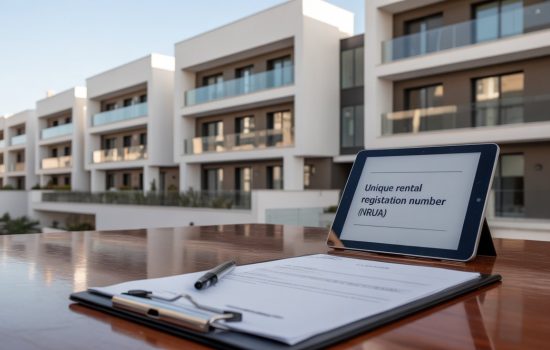
If you are a foreigner considering buying a property or investing in Spain, it is important to understand the basic tax aspects that may affect your finances.
Additionally, you need to determine whether you will be considered a tax resident or non-resident, as this will influence your tax obligations. Here we explain the most relevant concepts:
Tax Residency in Spain: Are You a Resident or Non-Resident?
Tax residency is an important factor for any foreigner living or investing in Spain, as it determines which taxes they must pay and on what income.
Criteria for Being Considered a Tax Resident in Spain
You are considered a tax resident in Spain if you meet any of the following criteria:
1. Staying in Spain for more than 183 days in a calendar year (from 1º of January till 31st of December)
- These days do not need to be consecutive.
- Sporadic absences may be counted as days in Spain if you cannot prove tax residency in another country.
2. Having Spain as the main base of your economic activities
- If your primary source of income comes from Spain (for example, you work or own a business here), you may be considered a tax resident.
3. Having your vital interests centered in Spain
- If your spouse and minor children reside in Spain, the Spanish Tax Agency may consider you a tax resident unless proven otherwise.
Practical Example: Are You a Tax Resident in Spain?
Example 1: John, a British Citizen with a Home in Alicante (Tax Resident in Spain)
John bought a property in Alicante for more than €500,000 and holds a Golden Visa. In 2024:
• He arrives in Spain on February 1st and stays until November 30th.
• He spends 10 months in Spain (more than 183 days in the calendar year).
• Although he maintains bank accounts and income in the UK, Spain considers him a tax resident.
Consequences for John:
✅ He must pay Personal Income Tax (IRPF) in Spain on his worldwide income.
✅ He may be subject to the Wealth Tax, depending on the value of his assets and regional regulations.
✅ He must pay Property Tax (IBI) annually.
Example 2: Lisa, a Dutch Citizen with a Vacation Home in Los Alcázares (Non-Tax Resident in Spain)
Lisa lives in Amsterdam and spends summers at her apartment in Murcia. In 2024:
• She arrives in Spain on June 1st and stays until September 15th (less than 183 days).
• Her business and primary residence are in the Netherlands.
• She has no spouse or children living in Spain.
Consequences for Lisa:
✅ She is not a tax resident in Spain and only pays taxes on her assets and income generated in Spain.
✅ She must pay the Non-Resident Income Tax (IRNR) annually, even if she does not rent out her property.
✅ She pays Property Tax (IBI) annually.
✅ She does not have to declare her income from the Netherlands in Spain.
These examples show how tax residency does not depend on nationality or visa type but rather on time spent in the country and other factors.
Key Tax Concepts Affecting Foreigners in Spain
1. Foreigner Identification Number (NIE)
- The NIE is a personal identification number assigned to foreigners in Spain for administrative purposes.
- It is required for any financial or legal transaction in Spain, such as purchasing property or opening a bank account.
- It should not be confused with the TIE (Foreigner Identity Card), which is a physical document that certifies legal residency.
2. Transfer Tax (ITP)
- Paid when purchasing a second-hand property.
- It varies by region and is calculated as a percentage of the property’s purchase price (between 6% and 10%)
3. VAT on New Property Purchases
- If buying directly from a developer, a 10% VAT applies to the purchase price.
- Additionally, the Stamp Duty (AJD – Actos Jurídicos Documentados) must be paid on new-build properties. This tax varies by region and typically ranges from 0.5% to 2% of the purchase price.
- Paid annually to the local government and varies depending on the cadastral value of the property.
- The tax is calculated by applying a percentage to this value, which ranges between 0.4% and 1.3%, depending on the municipality.
Example: For a property in Los Alcázares with a purchase price of €200,000, the cadastral value is usually lower, for example, €120,000. If the applicable rate is 0.75%, the annual IBI would be €900.
5. Non-Resident Income Tax (IRNR)
- If you are a non-resident and own property in Spain, you must pay this tax annually, even if you do not rent it out.
- The tax is calculated by applying a fixed percentage to the cadastral value of the property, which varies depending on whether the property’s cadastral value has been reviewed in the last ten years.
- Generally, the rate ranges between 1.1% and 2%, with a tax rate of 19% for EU residents and 24% for non-EU residents.
Example: For a property in Alicante with a purchase price of €200,000, the cadastral value may be lower, for example, €120,000. If the applicable coefficient is 1.1%, the taxable base would be €1,320. If the owner is an EU resident, they would pay 19% of that amount , a total of €251. If they are a non-EU resident, the 24% rate would result in a payment of €317.
Distinguishing between tax resident and non-resident status is essential to understanding your tax obligations in Spain. Knowing the most relevant taxes will help you plan and avoid legal issues.
If you are considering investing in Spain or changing your residence, it is important to understand the tax implications. Request our tax report, and we will explain in detail how it will affect your finances.
We want to help you navigate all the legal complexities that comes to buying or selling a house in Spain, but this article is legal information and should not be seen as legal advice.
- View more post about: IBI, Non-Resident Tax Return, Personal Income Tax Return, Property Transfer Tax, Tax Authorities Registration





